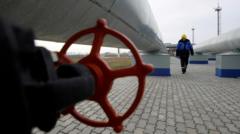Ukraine's decision to end a five-year gas transit agreement with Russia's Gazprom will significantly impact European nations still dependent on Russian gas, raising issues of electric supply, especially in Slovakia and Moldova.
End of Russian Gas Transit Through Ukraine Sparks Tensions in Europe

End of Russian Gas Transit Through Ukraine Sparks Tensions in Europe
Ukraine will cease the transit of Russian gas to Europe, intensifying geopolitical tensions and prompting concerns over energy security across the continent.
Ukraine announced on Wednesday the conclusion of its gas transit agreement with Russia's Gazprom, a move that President Volodymyr Zelensky declared was a stand against letting Russia "earn additional billions on our blood." This follows a drastic reduction in Russian gas imports by the EU since the onset of the war in Ukraine in 2022. Nevertheless, several eastern member states still rely on Russian gas, which annually contributes about €5 billion to the Kremlin's coffers.
The European Commission has assured that the continent's gas infrastructure is resilient enough to handle the cessation of Russian gas transit via Ukraine, indicating that Russian gas accounted for less than 10% of EU imports in 2023, down from 40% in 2021. Still, nations such as Slovakia and Austria remain heavily reliant on this energy source. Following Ukraine's announcement, tensions have risen with Slovakia, which now serves as the primary gateway for Russian gas into the EU and collects transit fees for distributing supplies to other countries.
Slovak Prime Minister Robert Fico, who recently met with Russian President Vladimir Putin, has threatened to cut off electricity supplies to Ukraine in retaliation. In response, Zelensky accused Fico of aiding Russia's war efforts and undermining Ukrainian sovereignty. Poland has stepped in to support Ukraine should Slovakia proceed with its threat, highlighting the significance of electricity exports for Ukrainian resilience amidst ongoing Russian attacks on its energy infrastructure.
Moldova, which depends on gas supplies passing through Ukraine, faces its own energy crisis as the cessation of Russian transit may jeopardize its primary power plant and the electricity supply for the separatist region of Transnistria. Moldovan authorities are urging energy conservation among citizens, while President Maia Sandu has accused the Kremlin of political manipulation ahead of upcoming elections in 2025.
Since the collapse of the Soviet Union, Russian gas has flowed through Ukrainian pipelines to Europe. As the EU seeks to diversify its energy sources, LNG imports from Qatar and the US, alongside piped gas from Norway, are becoming increasingly important. The discontinuation of the Ukrainian route leaves the TurkStream pipeline as the remaining channel for Russian gas into Europe. The European Commission's contingency plans aim to provide alternatives for affected countries, ensuring that gas supplies will flow through Greece, Turkey, Romania, and Poland, thereby maintaining energy security in central Europe.























